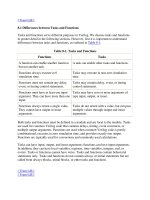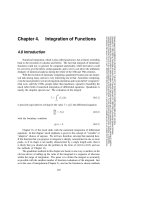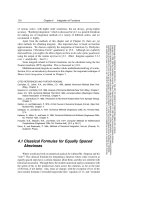Tasks And Functions part 1
Bạn đang xem bản rút gọn của tài liệu. Xem và tải ngay bản đầy đủ của tài liệu tại đây (32.78 KB, 7 trang )
[ Team LiB ]
8.1 Differences between Tasks and Functions
Tasks and functions serve different purposes in Verilog. We discuss tasks and functions
in greater detail in the following sections. However, first it is important to understand
differences between tasks and functions, as outlined in Table 8-1
.
Table 8-1. Tasks and Functions
Functions Tasks
A function can enable another function
but not another task.
A task can enable other tasks and functions.
Functions always execute in 0
simulation time.
Tasks may execute in non-zero simulation
time.
Functions must not contain any delay,
event, or timing control statements.
Tasks may contain delay, event, or timing
control statements.
Functions must have at least one input
argument. They can have more than one
input.
Tasks may have zero or more arguments of
type input, output, or inout.
Functions always return a single value.
They cannot have output or inout
arguments.
Tasks do not return with a value, but can pass
multiple values through output and inout
arguments.
Both tasks and functions must be defined in a module and are local to the module. Tasks
are used for common Verilog code that contains delays, timing, event constructs, or
multiple output arguments. Functions are used when common Verilog code is purely
combinational, executes in zero simulation time, and provides exactly one output.
Functions are typically used for conversions and commonly used calculations.
Tasks can have input, output, and inout arguments; functions can have input arguments.
In addition, they can have local variables, registers, time variables, integers, real, or
events. Tasks or functions cannot have wires. Tasks and functions contain behavioral
statements only. Tasks and functions do not contain always or initial statements but are
called from always blocks, initial blocks, or other tasks and functions.
[ Team LiB ]
[ Team LiB ]
8.2 Tasks
Tasks are declared with the keywords task and endtask. Tasks must be used if any one of
the following conditions is true for the procedure:
•
There are delay, timing, or event control constructs in the procedure.
•
The procedure has zero or more than one output arguments.
•
The procedure has no input arguments.
8.2.1 Task Declaration and Invocation
Task declaration and task invocation syntax are as follows.
Example 8-1 Syntax for Tasks
task_declaration ::=
task [ automatic ] task_identifier ;
{ task_item_declaration }
statement
endtask
| task [ automatic ] task_identifier ( task_port_list ) ;
{ block_item_declaration }
statement
endtask
task_item_declaration ::=
block_item_declaration
| { attribute_instance } tf_input_declaration ;
| { attribute_instance } tf_output_declaration ;
| { attribute_instance } tf_inout_declaration ;
task_port_list ::= task_port_item { , task_port_item }
task_port_item ::=
{ attribute_instance } tf_input_declaration
| { attribute_instance } tf_output_declaration
| { attribute_instance } tf_inout_declaration
tf_input_declaration ::=
input [ reg ] [ signed ] [ range ] list_of_port_identifiers
| input [ task_port_type ] list_of_port_identifiers
tf_output_declaration ::=
output [ reg ] [ signed ] [ range ] list_of_port_identifiers
| output [ task_port_type ] list_of_port_identifiers
tf_inout_declaration ::=
inout [ reg ] [ signed ] [ range ] list_of_port_identifiers
| inout [ task_port_type ] list_of_port_identifiers
task_port_type ::=
time | real | realtime | integer
I/O declarations use keywords input, output, or inout, based on the type of argument
declared. Input and inout arguments are passed into the task. Input arguments are
processed in the task statements. Output and inout argument values are passed back to the
variables in the task invocation statement when the task is completed. Tasks can invoke
other tasks or functions.
Although the keywords input, inout, and output used for I/O arguments in a task are the
same as the keywords used to declare ports in modules, there is a difference. Ports are
used to connect external signals to the module. I/O arguments in a task are used to pass
values to and from the task.
8.2.2 Task Examples
We discuss two examples of tasks. The first example illustrates the use of input and
output arguments in tasks. The second example models an asymmetric sequence
generator that generates an asymmetric sequence on the clock signal.
Use of input and output arguments
Example 8-2
illustrates the use of input and output arguments in tasks. Consider a task
called bitwise_oper, which computes the bitwise and, bitwise or, and bitwise ex-or of two
16-bit numbers. The two 16-bit numbers a and b are inputs and the three outputs are 16-
bit numbers ab_and, ab_or, ab_xor. A parameter delay is also used in the task.
Example 8-2 Input and Output Arguments in Tasks
//Define a module called operation that contains the task bitwise_oper
module operation;
...
...
parameter delay = 10;
reg [15:0] A, B;
reg [15:0] AB_AND, AB_OR, AB_XOR;
always @(A or B) //whenever A or B changes in value
begin
//invoke the task bitwise_oper. provide 2 input arguments A, B
//Expect 3 output arguments AB_AND, AB_OR, AB_XOR
//The arguments must be specified in the same order as they
//appear in the task declaration.
bitwise_oper(AB_AND, AB_OR, AB_XOR, A, B);
end
...
...
//define task bitwise_oper
task bitwise_oper;
output [15:0] ab_and, ab_or, ab_xor; //outputs from the task
input [15:0] a, b; //inputs to the task
begin
#delay ab_and = a & b;
ab_or = a | b;
ab_xor = a ^ b;
end
endtask
...
endmodule
In the above task, the input values passed to the task are A and B. Hence, when the task is
entered, a = A and b = B. The three output values are computed after a delay. This delay
is specified by the parameter delay, which is 10 units for this example. When the task is
completed, the output values are passed back to the calling output arguments. Therefore,
AB_AND = ab_and, AB_OR = ab_or, and AB_XOR = ab_xor when the task is
completed.
Another method of declaring arguments for tasks is the ANSI C style. Example 8-3
shows the bitwise_oper task defined with an ANSI C style argument declaration.
Example 8-3 Task Definition using ANSI C Style Argument Declaration
//define task bitwise_oper
task bitwise_oper (output [15:0] ab_and, ab_or, ab_xor,
input [15:0] a, b);
begin
#delay ab_and = a & b;
ab_or = a | b;
ab_xor = a ^ b;
end
endtask
Asymmetric Sequence Generator
Tasks can directly operate on reg variables defined in the module. Example 8-4
directly
operates on the reg variable clock to continuously produce an asymmetric sequence. The
clock is initialized with an initialization sequence.
Example 8-4 Direct Operation on reg Variables
//Define a module that contains the task asymmetric_sequence
module sequence;
...
reg clock;
...
initial
init_sequence; //Invoke the task init_sequence
...
always
begin
asymmetric_sequence; //Invoke the task asymmetric_sequence
end
...
...
//Initialization sequence
task init_sequence;
begin
clock = 1'b0;
end
endtask
//define task to generate asymmetric sequence
//operate directly on the clock defined in the module.
task asymmetric_sequence;
begin
#12 clock = 1'b0;
#5 clock = 1'b1;
#3 clock = 1'b0;
#10 clock = 1'b1;
end
endtask
...
...
endmodule









